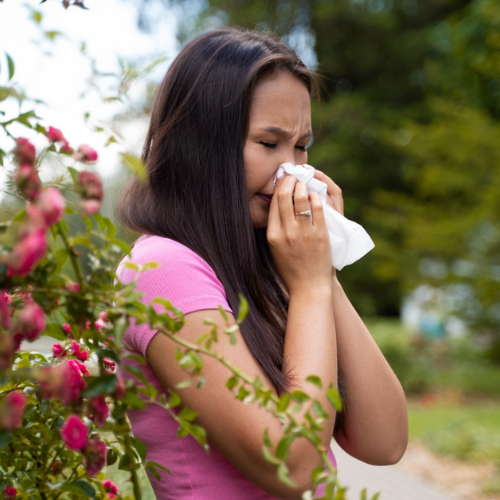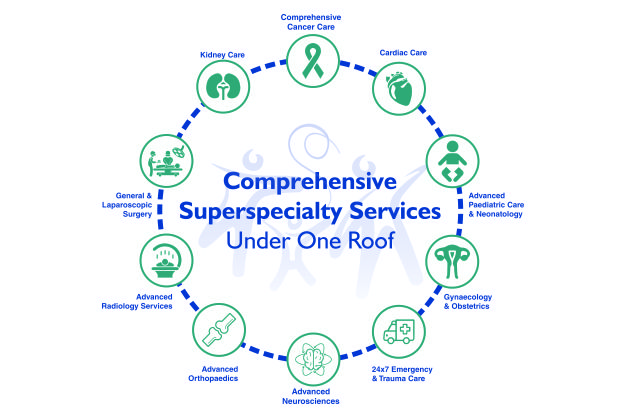
DATE : 04/12/2023
AUTHOR : AIMS Hospital
What is the Pollen Allergy ? What are its causes and symptoms ?
Introduction
As spring blooms and flowers burst into a riot of colors, the air becomes filled with tiny, seemingly innocuous particles known as pollen grains. While these grains play a crucial role in the reproduction of plants, for many individuals, they bring about an unwelcome annual visitor – pollen allergies.
Causes of Pollen Allergies
Pollen allergies, also known as hay fever or allergic rhinitis, occur when the immune system reacts abnormally to pollen grains. The immune system mistakenly identifies pollen as a threat and releases chemicals, such as histamines, leading to allergy symptoms. The primary culprits behind pollen allergies are airborne pollen grains released by trees, grasses, and weeds.
Common sources of airborne pollen include:
1. Trees: Many trees release pollen in the spring, including oak, birch, maple, and pine.
2. Grasses: Grass pollen is a common trigger for allergies, with species like Bermuda, Timothy, and Ryegrass being notable contributors.
3. Weeds: Ragweed, sagebrush, and lamb's quarters are examples of weeds that release copious amounts of pollen.
Symptoms of Pollen Allergies
Pollen allergies can manifest in a variety of symptoms, ranging from mildly inconvenient to significantly impacting daily life. These symptoms include:
1. Sneezing: Frequent and uncontrollable sneezing is a common symptom of pollen allergies.
2. Runny or Stuffy Nose: Nasal congestion or a runny nose, often accompanied by an itchy sensation, is prevalent.
3. Watery Eyes: Irritation and excessive tearing of the eyes are common symptoms, making outdoor activities challenging.
4. Itchy Throat and Ears: Pollen allergies can cause irritation in the throat and ears, leading to discomfort.
5. Fatigue: Constant exposure to allergens can result in fatigue and a general feeling of malaise.
6. Coughing: Persistent coughing may occur, especially if postnasal drip is present.
7. Skin Irritation: Some individuals may experience skin reactions such as hives or eczema.
Treatment Options for Pollen Allergies
While pollen allergies can be bothersome, several treatment options can help manage symptoms and improve overall well-being. Consider the following approaches:
1. Antihistamines: Over-the-counter or prescription antihistamines can help alleviate symptoms by blocking the effects of histamines.
2. Nasal Corticosteroids: These nasal sprays reduce inflammation in the nasal passages, providing relief from congestion and other symptoms.
3. Decongestants: Oral or nasal decongestants can temporarily relieve nasal congestion, but prolonged use should be avoided to prevent rebound congestion.
4. Allergy Immunotherapy: Allergy shots or sublingual tablets can be prescribed by allergists to desensitize the immune system to specific allergens, including pollen.
5. Avoidance Measures: Minimize exposure to pollen by staying indoors on high-pollen days, keeping windows closed, and using air purifiers.
6. Allergy-Friendly Landscaping: Choose landscaping plants with low pollen production to reduce allergen exposure around your home.
Conclusion
Pollen allergies can indeed cast a shadow on the joy of the changing seasons, but with proper understanding and management, individuals can regain control of their well-being. By identifying the causes, recognizing symptoms, and exploring various treatment options, those affected by pollen allergies can navigate through the pollen-laden seasons with greater ease, allowing for a more enjoyable and symptom-free experience. Always consult with a healthcare professional for personalized advice and treatment.
At AIMS Hospital, Dombivli, our dedicated allergy specialists employ a comprehensive approach to treat pollen allergies. Combining advanced diagnostic tests with personalized treatment plans, including antihistamines, nasal corticosteroids, eye allergy and allergy immunotherapy, we strive to alleviate symptoms and enhance the overall well-being of our patients, ensuring a pollen-free and comfortable life.
For more details, please call us at: 0251 – 6185000.
ABOUT US
About AIMSDirector's Message
Vision & Mission
Accreditations
Awards & Accolades
Our Network
Phone Directory
Designed by Web Creations 2022. All rights reserved.










